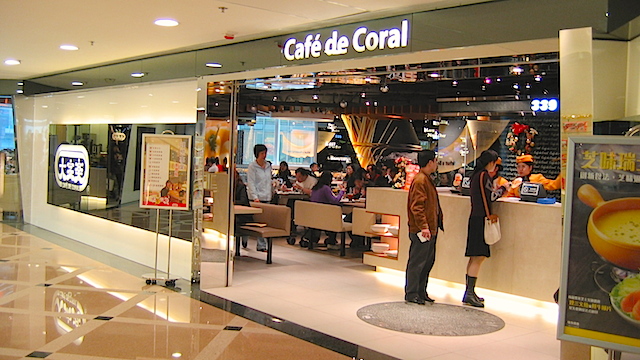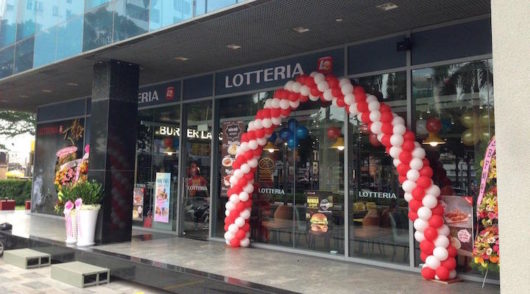Listed QSR operator Cafe de Coral has reported an eight per cent rise in same store sales and a strong performance in Hong Kong, despite challenging mainland China market.
The company released its 2015 year financials today (June 23) reporting a 7.8 per cent increase in turnover to HK$7.356 billion and a modest one per cent increase in profit attributable to shareholders to $587 million.
The Hong Kong QSR and institutional catering operations, led by its namesake Cafe de Coral restaurant chain and western concept Spaghetti House, outperformed the broader market, sales increasing by 10 per cent to $5.26 billion in the year to March 31. Hong Kong accounts for 83 per cent of the company’s turnover.
CEO Hoi Lo said the company achieved a “strategic leap in the fast casual segment”.
“During the year, we expanded the group’s fast casual portfolio. We scaled up our home-grown concepts Shanghai Lao Lao and Mixian Sense and signed on popular Korean and Japanese brands, all of which brought new impetus and fuelled the growth of the fast casual segment in our business.”
It also streamlined its operations, divesting Manchu Wok, SenseAsian and Wasabi Grill and Noodle businesses in North America; and its 50 per cent share in the Hong Kong business of Taiwanese-founded 85˚C bakery business. Despite the brand cull, the company retained nearly 17,500 staff as at the end of March.
Café de Coral and Super Super Congee & Noodles are among the leading QSR brands in Hong Kong with sizeable market shares. The company operated 156 Café de Coral fast food outlets and 35 Super Super Congee & Noodles shops as of the end of March.
Now considered household names, these brands have won the trust and support of our customers in Hong Kong, said Lo.
Now Cafe de Coral Holdings is expanding its portfolio of brands to further build its share of the greater QSR market.
New brands, Just About Food and C. Express will continue to be expanded, along with full-service chains Shanghai Lao Lao and Mixian Sense, both targeting a younger demographic.
“We continue to rejuvenate the Oliver’s Super Sandwiches brand and concept to ensure it stays relevant to our diverse customer groups,” said Lo.
“Our collaboration with well-known Japanese and Korean partners has also enabled us to enrich our fast casual portfolio. The recent opening of The Cup, a Korean lifestyle fast casual chain, in Hong Kong as well as the forthcoming Japanese donburi and pasta chains will further expand the group’s presence in the fast casual sector.
Cafe de Coral sees its primary growth engine in the years ahead to be the mainland China market which Lo describes as “highly dynamic and competitive.
“Players from all over the world are eyeing on this lucrative market. That being said, the rapid change of business environment and consumer habits in this fast-growing industry is a constant challenge for business operators in the country. The Café de Coral Group has a long-standing presence in the Mainland and has gained a good understanding of the country’s business environment and consumer preference. This has helped us formulate the effective business strategies for the group in capturing opportunities and unleashing our potential in the country.
“Setting the right geographical strategy is a crucial theme in our long-term growth plans for the Mainland. By taking advantage of our similarities in culture and language as well as our close proximity to Guangdong, the group is well positioned to branch out in the cities of this province. Its vast population and economic maturity provide the Café de Coral Group with ample opportunities for business expansion, and we are committed to growing our leading chains and to capturing a larger share of this market with new concepts and exciting brands,” he said.
Growth in Mainland China’s catering industry continued to slow down during the year, partly
due to lower spending on business-related dining and receptions.
“This affected not only high-end restaurants but also other segments in the country’s weakening dining industry. In face of the business environment and market trend, we had adjusted our shop-opening strategy and pace during the year,” said Lo.
“However, operating costs for our Mainland China business, especially those for rental and labour, have been rising substantially over the past years. These combined have affected the profitability of our business operation in the Mainland.”
Despite the positive comparable sales growth of three per cent achieved by the company’s 100-outlet South China Café de Coral chain, the total revenue level of the business operations in Mainland China was flat compared with the previous financial year, largely due to the adjusted shop-opening pace. The Spaghetti House experienced a setback in its performance due to declining consumer spending in the mid-priced dining sector.
Looking ahead, Lo said the macroeconomic environment in greater China remains a concern, owing to economic conditions in Hong Kong and the uncertainties of the business environment in Mainland China.
“High rental rates, rising raw material costs and the persistent labour shortage all remain challenges for our business and operation. Nevertheless, we are confident that the solid foundation supporting our business and the robust infrastructure we have built under the group’s sustainability initiatives in the past years will enable us to continue our near-term business development and five year growth plans,” he said.
“Our steady and prudent shop-opening program for both our leading brands and our younger concepts will continue. With the new ventures we have taken on, we will seize the most opportune time to expand in our key markets.”






